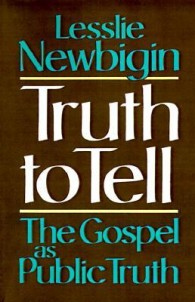The Gospel as public truth—it must govern every facet of human life…

The Gospel becomes something other than the Gospel if it is relegated to the private realm. Compartmentalized, privatized faith was not what the early Proclaimers of the Good News had in mind. Declaring what they had “seen and heard,” they expected to provoke reactions, some potentially severe. They had been warned by Jesus himself: “If they persecuted me, they will also persecute you.”
By its very nature, Christianity is not a privatized faith! Theologian and missionary Lesslie Newbigin put it this way: “To claim that the Gospel is public truth … is to insist that the Gospel must be heard as an affirmation of the truth which must finally govern every facet of human life.” It cannot be restricted to our “personal and domestic lives.”
It is not so often acknowledged that evangelism means calling people to believe something which is radically different from what is normally accepted as public truth, and that it calls for a conversion not only of the heart and will but of the mind. A serious commitment to evangelism, to the telling of the story which the Church is sent to tell, means a radical questioning of the reigning assumptions about public life. It is to affirm the gospel not only as an invitation to a private and personal decision but as public truth which ought to be acknowledged as true for the whole of the life of society. …
[T]he opening words of the ministry of Jesus include the word metanoete. At the very beginning we are warned that to understand what follows will require nothing less than a radical conversion of the mind. …
The problem of making sense of the gospel is that it calls for a change of mind which is as radical as is the action of God in becoming man and dying on a cross. …
[W]hen the Church affirms the gospel as public truth it is challenging the whole of society to wake out of the nightmare of subjectivism and relativism, to escape from the captivity of the self turned in upon itself, and to accept the calling which is addressed to every human being to seek, acknowledge, and proclaim the truth. …
Our problem is that most of us who are Christians have been brought up bilingual. For most of our early lives, through the accepted systems of public education, we have been trained to use a language which claims to make sense of the world without the hypothesis of God. For an hour or two a week we use the other language, the language of the Bible. We are like the Christian congregations under the milet systems of the Persian and Muslim empires: we use the mother tongue of the Church on Sundays, but for the rest of our lives we use the language imposed by the occupying power. But if we are true to the language of the Church and the Bible, we know that this is not good enough. The incarnate Word is Lord of all, not just of the Church. There are not two worlds, one sacred and the other secular. There are differing ways of understanding the one world and a choice has to be made about which is the right way, the way that corresponds to reality to the reality beyond all the show which the ruler of this world can put on. …
We have a gospel to proclaim. We have to proclaim it not merely to individuals in the personal and domestic lives. We do certainly have to do that. But we have to proclaim it as part of the continuing conversation that shapes public doctrine. It must be heard in the conversation of economists, psychiatrists, educators, scientists and politicians. We have to proclaim it not as a package of estimable values, but as the truth about what is the case, about what every human being and every human society will have to reckon with. When we are faithful in this commission we are bound to appear subversive to those who believe that the cosmos is a closed system. We may appear to threaten the achievements of these centuries in which this has been the reigning belief. In truth we shall be offering the only hope of conserving and carrying forward the good fruits of these centuries into a future which might otherwise belong to the barbarians. …
[W]hen the Church is seen simply as a voluntary society made up of those individuals who have decided to accept the Christian faith and to join themselves together for its nourishment and exercise, then the danger is that the ethical implications of the gospel come to be regarded as merely house rules for the Church, guidance for Christian behavior rather than the law of the creator with jurisdiction over the entire human family. …
These excerpts are from Lesslie Newbigin’s Truth to Tell: The Gospel as Public Truth. They were originally assembled and posted on the website of Mars Hill Audio. Truth to Tell is available online in PDF. The book may be purchased here.
Additional comments by Lesslie Newbigin on the public nature of the Gospel were published in Touchstone Magazine, “The Gospel as Public Truth.”


 November 11, 2014
November 11, 2014 







Comments are closed.